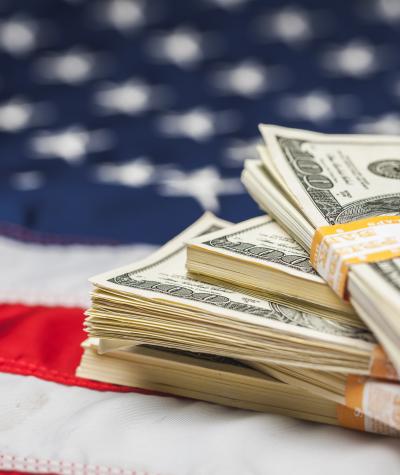In American politics, money won’t ensure victory, but it will give you a greater chance to win.
Campaigning in the United States gets more expensive every cycle, and the 2020 general elections are projected to have cost an unprecedented $14 billion. Political ad spending topped $1.5 billion this year in the presidential race alone.
The role of money in politics is far greater than influencing election outcomes: it remains a defining and corrosive feature of our entire political process, helping to determine who is able to run for office, and which voices are heard after candidates become elected representatives.
The prohibitive price tag of successful campaigning can serve as a barrier to entry for potential candidates: in order to mount a viable run for office, they generally need access to funds and other resources through an existing network of wealthy friends and associates.
And after the election is over, the wealthy special interests who provide disproportionate amounts of campaign funds often expect something in return and are regularly granted political favors and undue influence.
Granted, winning the fundraising battle does not alone guarantee electoral victory. That was illustrated most clearly in South Carolina and Kentucky, where Democratic candidates Jaime Harrison and Amy McGrath shattered fundraising records, but both lost their races badly to incumbent Sens. Lindsey Graham and Mitch McConnell.
Graham won by more than 10% and McConnell won by nearly 20%.
These high-dollar, high-profile losses, however, hardly show that money doesn’t matter.
Instead, these races are exceptions to the rule: the candidate with the most money still usually wins. In 2020, according to the Center for Responsive Politics, 89.1% of House candidates and 69.7% of Senate candidates that outspent their opponents won their elections. In 2016, 95.4% of top spending House candidates and 85.3% of top spending Senate candidates won.
More than 90% of the money that McGrath and Harrison raised came from out-of-state donors, reflecting a nation-wide anger toward two of the most visible Senate Republicans. But nationwide donors don't vote in the Kentucky and South Carolina senate races, voters in Kentucky and South Carolina do.
Those voters ultimately did not share the national desire to remove McConnell and Graham from their seats. (McGrath reportedly struggled to balance a progressive policy platform to appeal to her out-of-state donors while campaigning for the votes of moderate and conservative voters in Kentucky.)
The millions raised by McGrath and Harrison likely made their races more competitive than they would have been otherwise. But Kentucky and South Carolina remain deeply red states. Demographics, partisan advantages, incumbency, and other factors still play roles in determining the winner of any given race.
To understand what happened in these states, it is worth noting that campaign fundraising can be a money-making opportunity for political consultants and insiders. In 2018, the top 10 highest-paid political consulting firms earned a mammoth $552 million dollars.
Consultants had a fiscal incentive to encourage voters across the country to channel their anger into opposing McConnell and Graham, rather than giving to grassroots organizing efforts in tighter, less splashy races where their dollars may have had a greater impact.
Money buys access above and beyond that granted to everyday Americans. Candidates frequently host fundraisers with four and five figure contribution minimums, giving wealthy donors attention and facetime behind closed doors that the average voter would never get.
For example, Sen. Kelly Loeffler, who is currently amid a run-off election in Georgia to keep her seat, termed big donors her “Executive Council,” promising exclusive access through events and conference calls.
While most candidates are more subtle about how they do it, Loeffler’s Executive Council reflects a fairly common practice of offering access in exchange for money. Access, in turn, commonly translates to an opportunity to shape policy or receive political favors.
In a 2017 study, the Roosevelt Institute looked at Congressional voting on banking reforms, and found a correlation between Democratic members’ support of weakening regulations, and the amount of money they received from the financial industry.
Ultimately, money determines which voices are heard and which policies are prioritized. Too often, the demands of wealthy special interests guide public policy, despite those interests often not reflecting the needs or desires of the American public.
The only way to address the corrosive impact of big money in politics is through systemic reform. Congress has an opportunity to take a large step in that direction by passing H.R.1, the For the People Act.
H.R. 1 would bring about a series of campaign finance reforms, including strengthening disclosure requirements to bring to light the influence of wealthy special interests, and establishing a small donor funded public financing system to knock down barriers to entry for potential candidates lacking extensive funds or networks of wealthy donors.
It is time to put power back in the hands of the American people.

